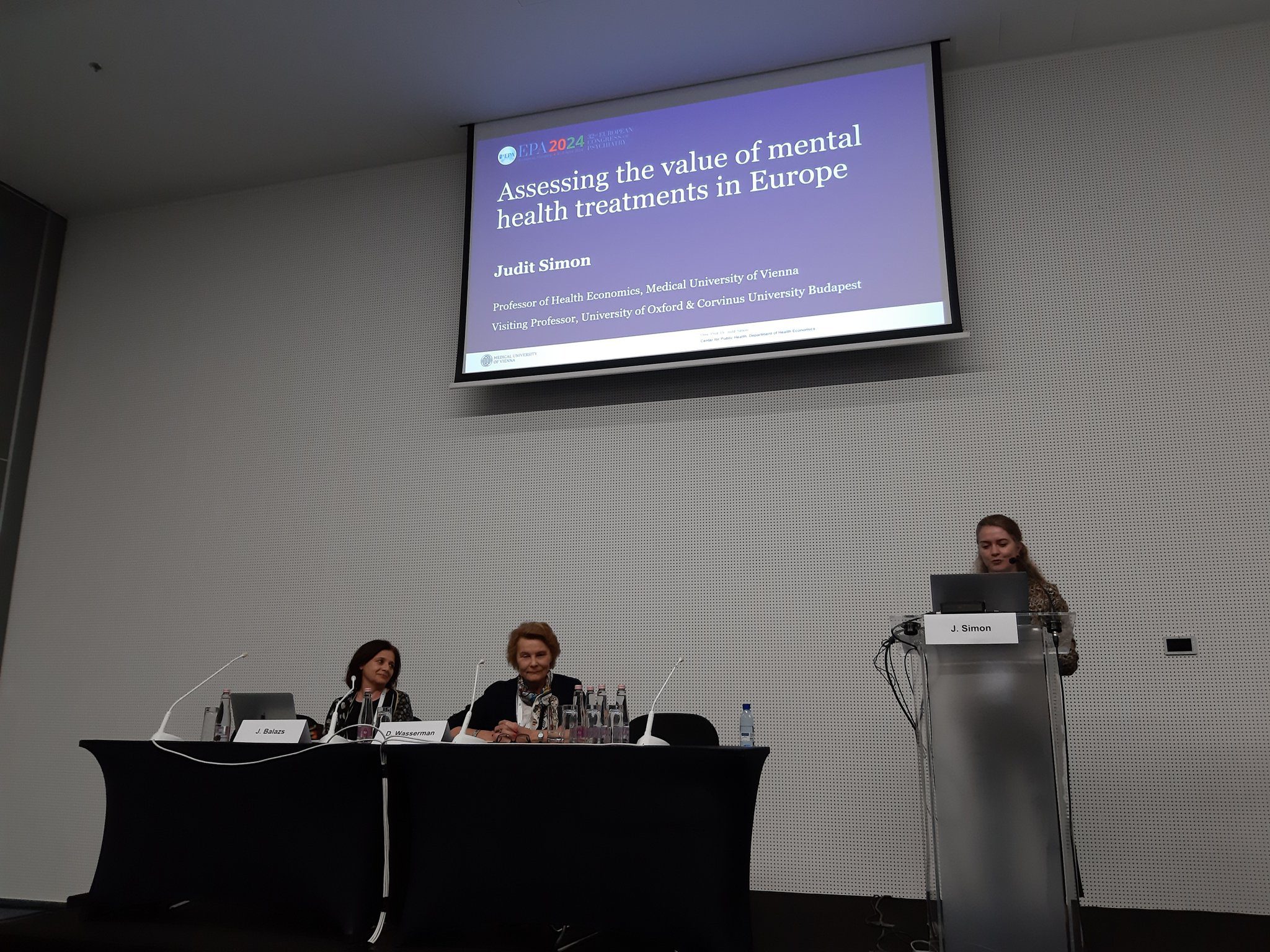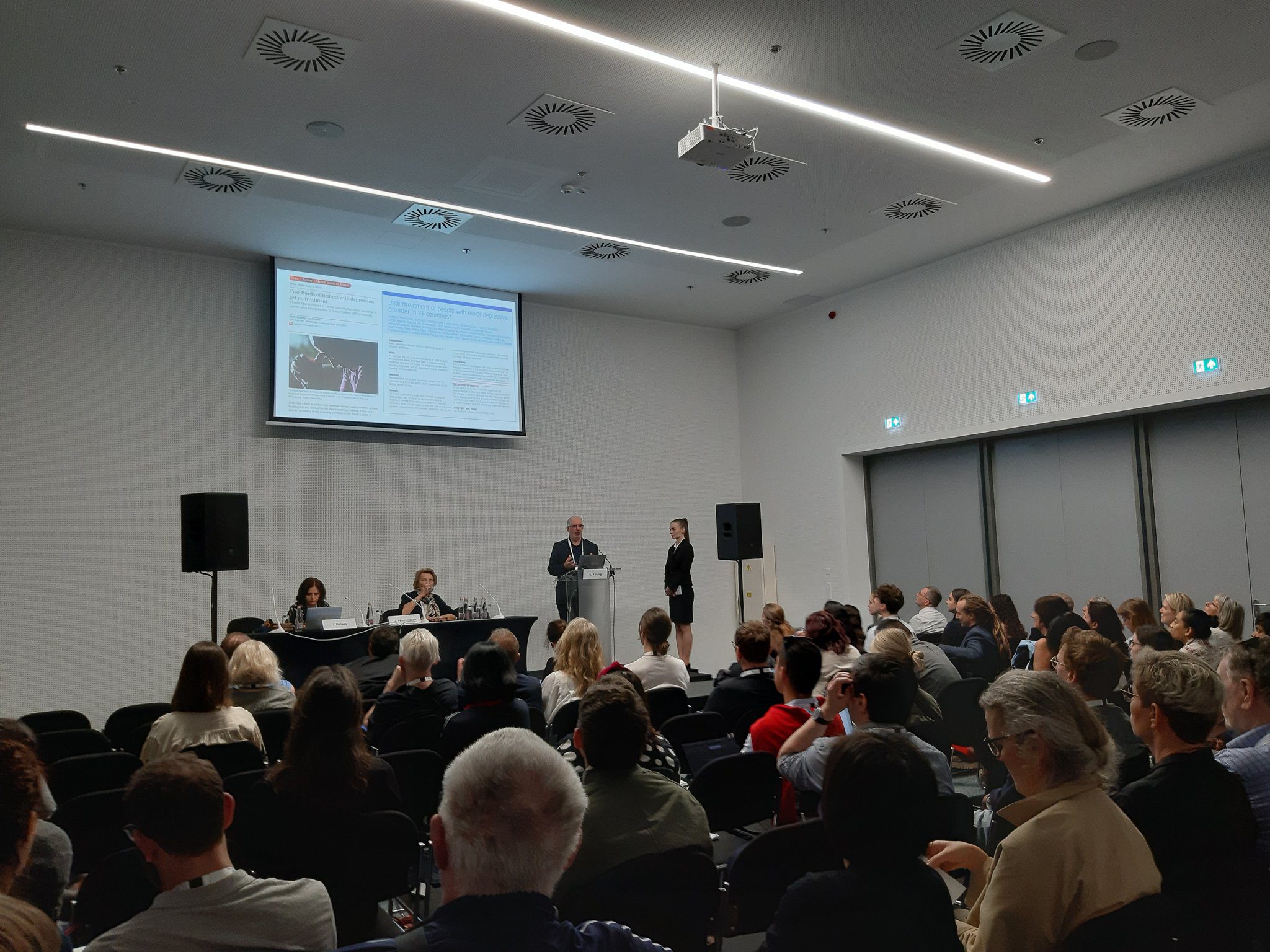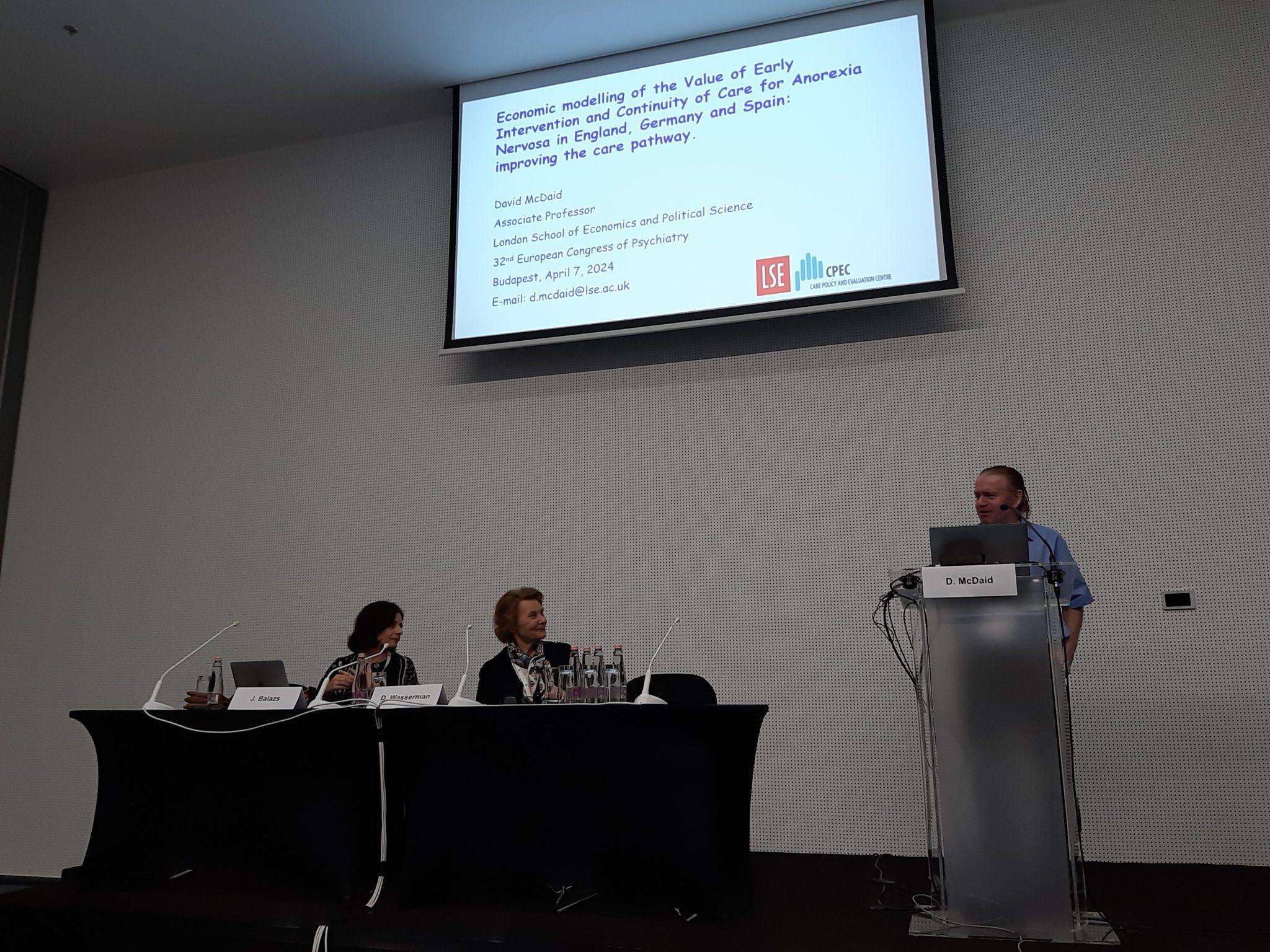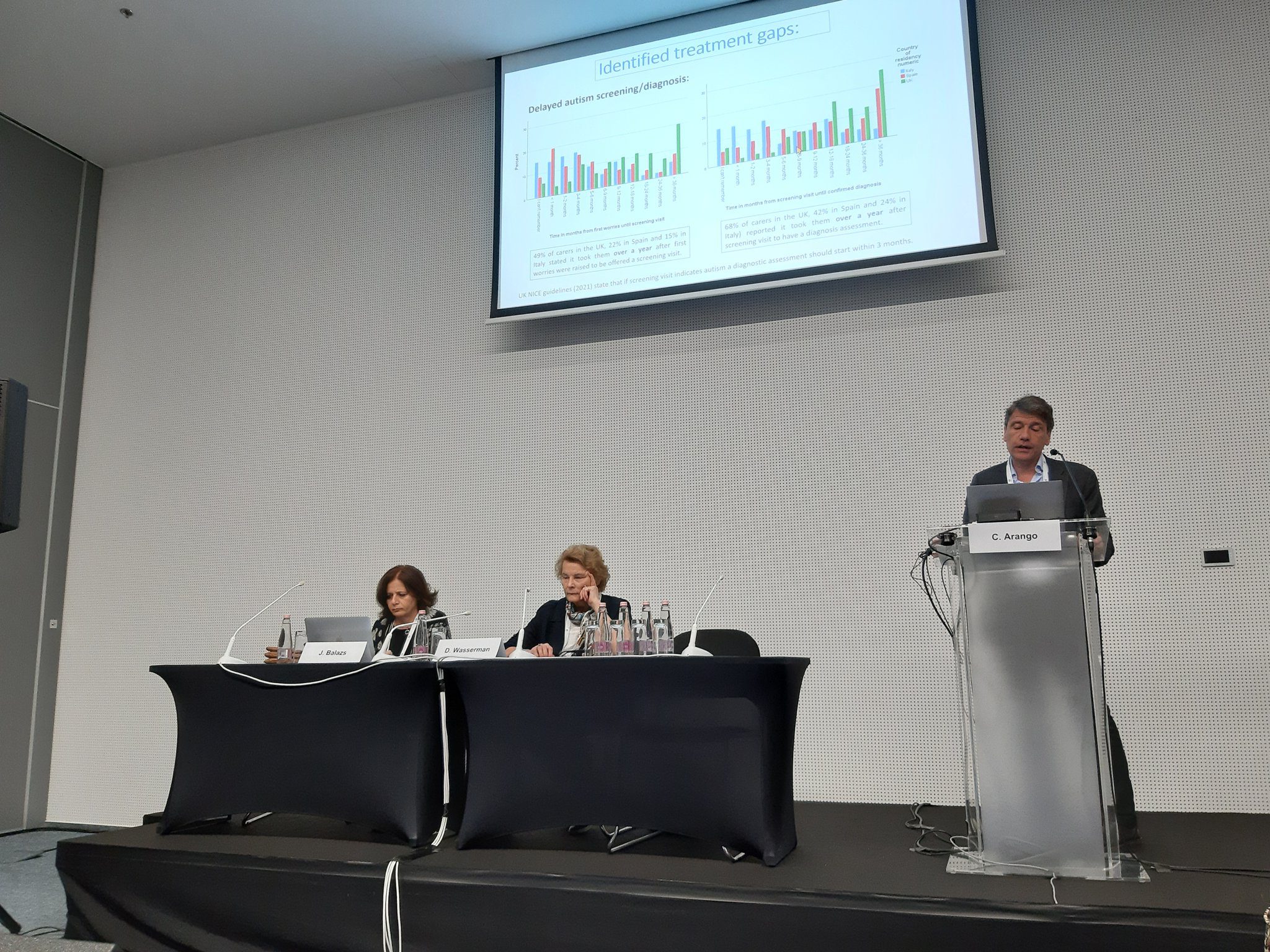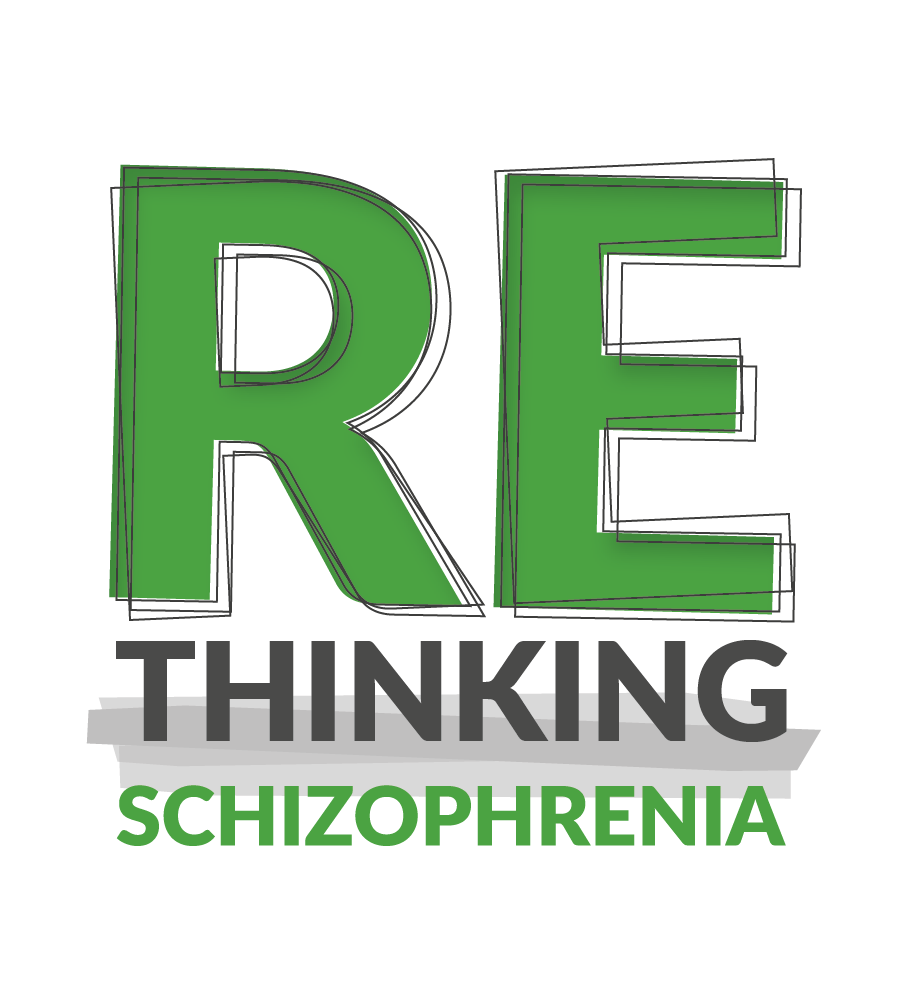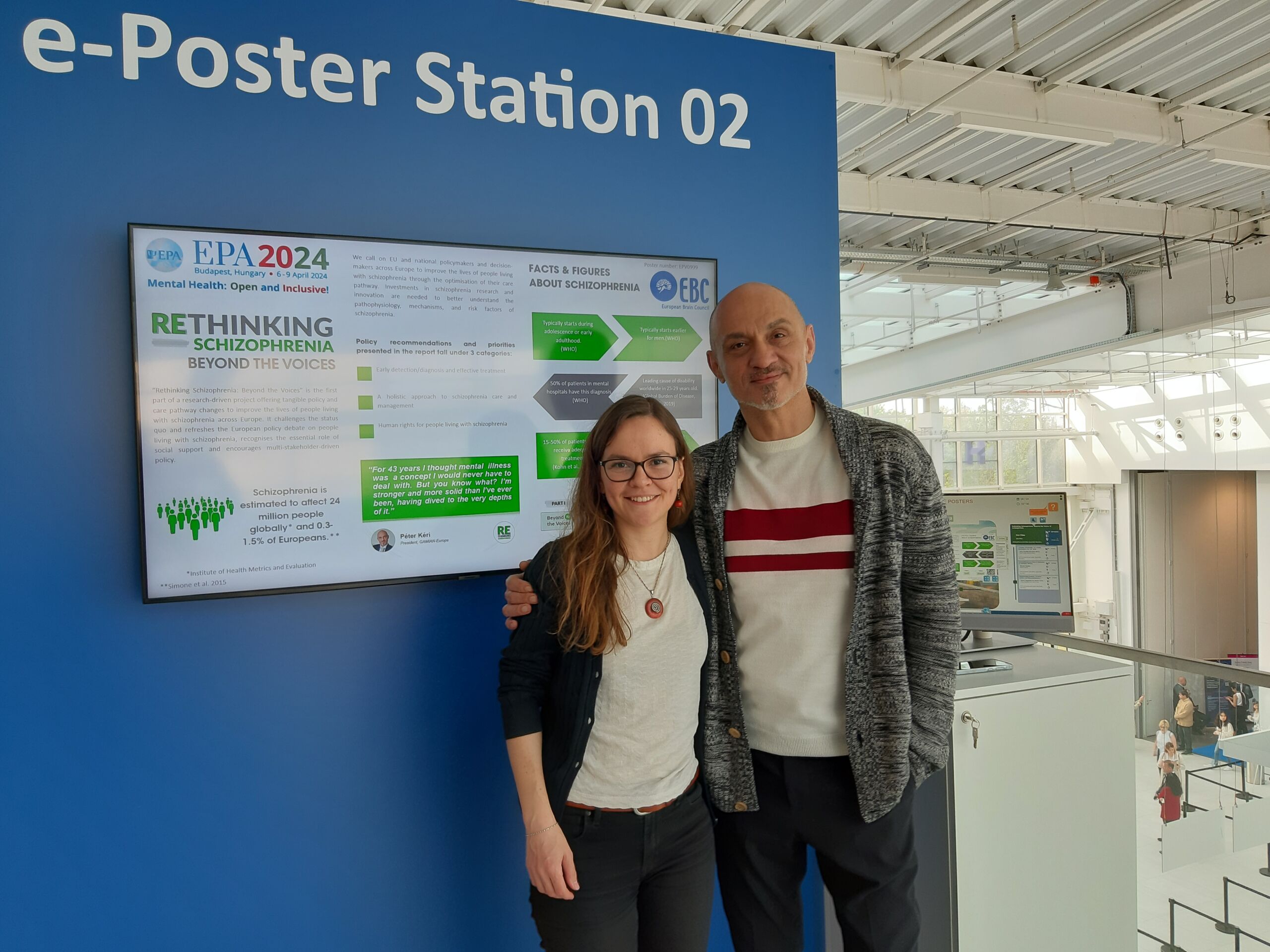The European Brain Council had the chance to attend the 32nd European Congress of Psychiatry which was held on 6-9 April 2024 in Budapest (Hungary). The Congress took place under the motto ‘Mental Health: Open and Inclusive!’. It highlighted three core aspects of modern psychiatry:
- Mental health as a broad dimension from mental health prevention and resilience building to the treatment of specific disorders.
- Open refers not only to our fundamental human rights but also to open mindedness and curiosity for novel approaches and ideas.
- Inclusive implies welcoming and respecting differences between people.
Assessing the Value of Mental Health Treatments for Youth in Europe
EBC held the Symposium “Assessing the value of mental health treatments for youth in Europe” on Sunday 7 April 2024 to raise awareness on mental disorders and their societal impact. The session highlighted the case studies falling under the 2nd round of the Value of Treatment project, coordinated by EBC.
The morning kicked off with a welcome address from the meeting Chairs: Prof. Danuta Wasserman, M.D., Ph.D. Professor of Psychiatry and Suicidology, Karolinska Institutet, Stockholm, Sweden and Prof. Judit Balazs, Chair, EPA Scientific Section on Child and Adolescent Psychiatry, Eotvos Lorand University, Budapest, Hungary, Oslo New University College, Oslo, Norway. Danuta Wasserman and Judit Balazs stressed the importance to join forces for policy implications towards an enabling ecosystem for mental disorders focusing on youth needs.
Prof. Celso Arango, Department of Child and Adolescent Psychiatry, Institute of Psychiatry and Mental Health, Hospital General Universitario Gregorio Marañón, IiSGM, School of Medicine, Universidad Complutense, CIBERSAM, Madrid, Spain, presented the results of the study on Autism care pathway in Europe. Celso Arango stressed the importance of early intervention. Despite autism’s known societal and personal impact, Europe-wide consensus and support for early detection, diagnosis, and intervention are lacking. The findings call for policy harmonization in Europe to shorten long wait times for diagnosis and personalized support and therefore, improve autistic people and their families’ journey experience and quality of life.
“The earliest the intervention for autistic children, better the prognosis is. It is essential that early screening is provided to children by psychiatrists with the key role of primary care providers and pediatricians so that treatment can start early and improve the efficiency of the treatment received by this population.”
Prof Allan Young, King’s College London, United Kingdom then presented the results of the study on Care pathways for people with major depressive disorder. Allan Young highlighted that many individuals with major depressive disorder are not receiving treatment at any one time, and it is known that both duration of untreated illness and the number of ineffective treatments trialed are risk factors for poorer long-term outcomes.
“Together, these phenomena demonstrate a need for improved management of major depressive disorder. Data on the costs of illness need to be shared with policy makers. Beyond prevention, continuity of care is also valuable from an economic perspective.”
“Severe anorexia nervosa requires long and extensive stay of in-patient care. Evidence suggests specialist eating disorders services for adults with anorexia nervosa have the potential to improve outcomes and reduce costs through reduced hospital admissions.”
Prof. David McDaid, Health Policy and Health Economics at the Care Policy and Evaluation Centre, Department of Health Policy at the London School of Economics and Political Science, drew attention on the findings from the recent study on Economic modelling of the Value of Early Intervention and Continuity of Care for Anorexia Nervosa in England, Germany and Spain: improving the care pathway.
“Analyzing multiple diseases jointly also made the resulting conclusions more impactful for public health and reinforced the call for pan-European actions. Future efforts towards optimal mental health care pathways will require both explicit value and affordability considerations and the alignment of relevant public reimbursement plans in order to reduce the already immense economic burden on patients and families”.
Prof. Judit Simon, Department of Health Economics, Center for Public Health, Medical University of Vienna, Austria, closed the session addressing the need to Assessing the value of mental health treatments in Europe. The EBC Value of Treatment case studies found that, although established clinical guidelines are available for Anorexia Nervosa, Autism Spectrum Disorder, and Major Depressive Disorder, there are major geographical care variations in Europe, leading to reduced effectiveness and efficiency and substantial negative health impacts. Due to the lack of relevant surveillance and monitoring tools, the magnitude of these care variations remains unknown. Furthermore, outcome and cost estimates remain limited due to the underdeveloped evidence base. Nevertheless, the case studies confirm the added value of early detection and intervention and the implementation of a continuous and comprehensive cross sectoral approach as opposed to fragmentation in separate medical (and non-medical) “silos”. Beyond prioritizing early detection and prevention, the challenges of data for a cross sectoral approach remain but there are existing tools to address these.
Prof. Danuta Wasserman and Prof. Judit Balazs concluded that policy prioritization on prevention, adequate treatments and a cross sectoral approach for mental disorders is essential for youth with mental disorders. Three-quarters of all mental health disorders develop before age 25, with many presenting initially in undiagnosed forms already in the mid-teens and eventually manifesting as severe disorders and lasting into old age. Vinciane Quoidbach, EBC Research Project Manager thanked the Speakers and the Chairs for the high-quality presentations and their insightful contribution to the EBC session. The robustness of the case study results related to anorexia nervosa, autism spectrum disorder and major depressive disorder demonstrates the added value of such research combining a care pathway analysis, mental health economics study and intercountry healthcare assessment. Some elements of an enabling ecosystem, however, remain universal such as health promotion, transition, and integrated care – key to avoid dropouts; more work on stigma; important educational tasks for the psychiatrists and the mental health community with a real emphasis on people with severe mental illness and their needs. The Session ended after a fruitful open discussion engaging the audience.
Rethinking Schizophrenia: Beyond the Voices
EBC also had an e-poster viewing “Rethinking Schizophrenia: Beyond the Voices” in the e-poster area. The e-poster featured the recently published policy report “Rethinking Schizophrenia: Beyond the Voices”. Rethinking Schizophrenia is a research-driven project, coordinated by EBC, offering tangible policy changes to improve the lives of people living with schizophrenia across Europe. It challenges the status quo and refreshes the European policy debate on people living with schizophrenia and encourages multi-stakeholder-driven policy. The project falls under #BeyondTheVoices campaign.
Despite improvements and innovation in recent years, people living with schizophrenia face variations in access to optimal treatment and care. There is a lot about schizophrenia that is not fully understood and the high-quality care and support needed by people living with this condition is often unavailable.
There is a clear need to rethink the management of schizophrenia and redesign the care pathways to ensure optimal treatment and care for all people living with schizophrenia in Europe. Based around patient testimonies, the aim of the project is to highlight the need to optimise the way we manage schizophrenia by building a strong, coherent, evidence-based policy narrative which speaks to the current priorities in schizophrenia and draws from the current policy landscape in Europe.
Throughout the congress, EBC held a booth in the exhibition space where the participants had the chance to learn more about the current projects, the ongoing activities and the upcoming events.
The next edition of the European Congress of Psychiatry will take place on 5-8 April 2025 in Madrid (Spain). The Congress will be held under the overarching theme “Towards Real-World Solutions in Mental Health”. You can look forward to excellent science, high-level educational programmes and a clear focus on clinical implementation.






